Organisational Behaviour Analysis: A David & Co Limited Performance
VerifiedAdded on 2020/12/26
|18
|5669
|477
Report
AI Summary
This report provides an in-depth analysis of organisational behaviour, focusing on the case of A David & Co Limited. It explores the influence of organisational culture, politics, and power on individual and team behaviour, examining how these elements impact performance. The report delves into content and process theories of motivation, including Maslow's and Herzberg's theories, as well as Vroom's expectancy theory, to assess their effectiveness in achieving organisational goals. It also differentiates between effective and ineffective teams, highlighting the factors that contribute to team success. The report concludes by summarising the key concepts and philosophies of organisational behaviour within the context of the chosen business situation, offering insights into how these principles can be applied to enhance organisational effectiveness and employee satisfaction.
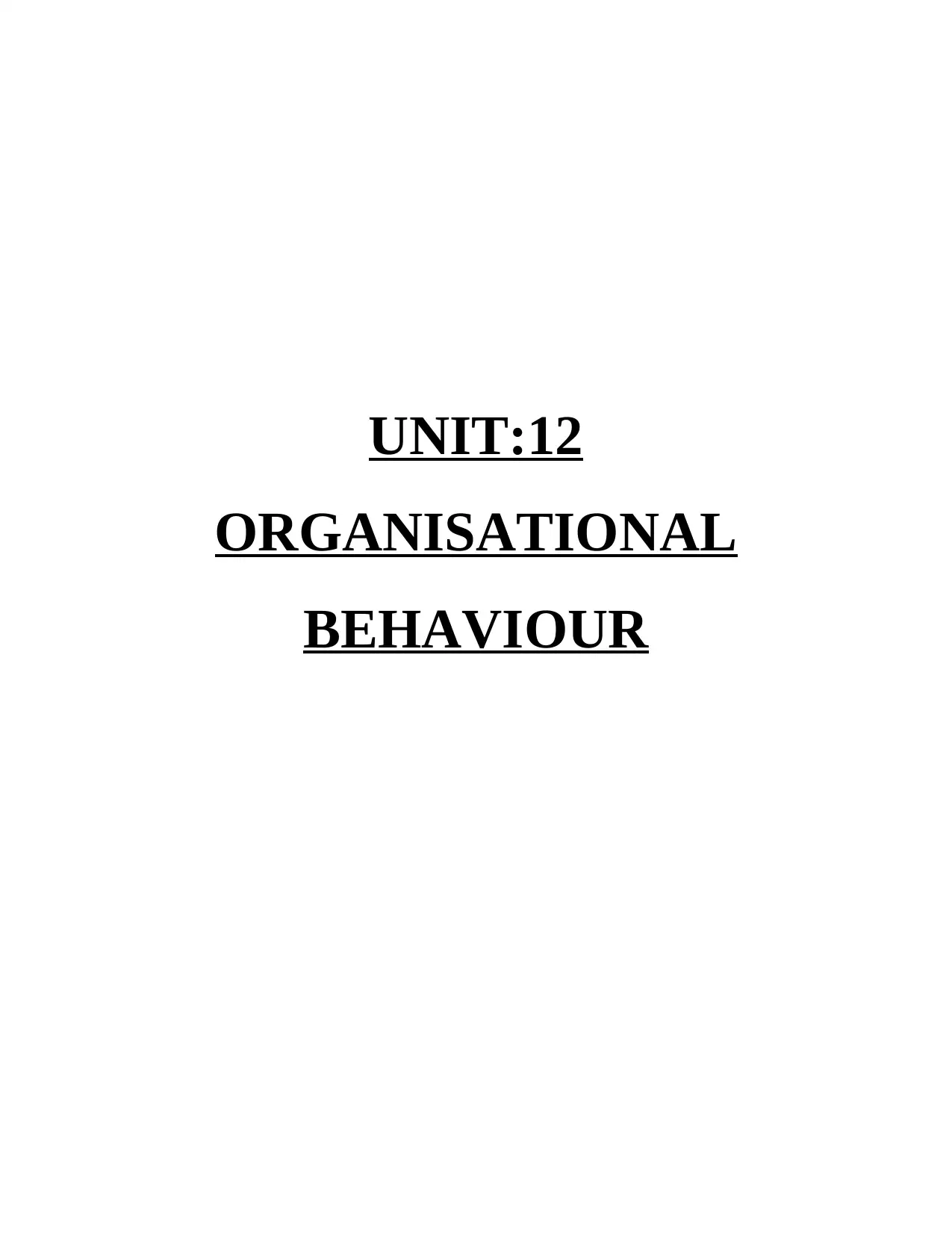
UNIT:12
ORGANISATIONAL
BEHAVIOUR
ORGANISATIONAL
BEHAVIOUR
Paraphrase This Document
Need a fresh take? Get an instant paraphrase of this document with our AI Paraphraser
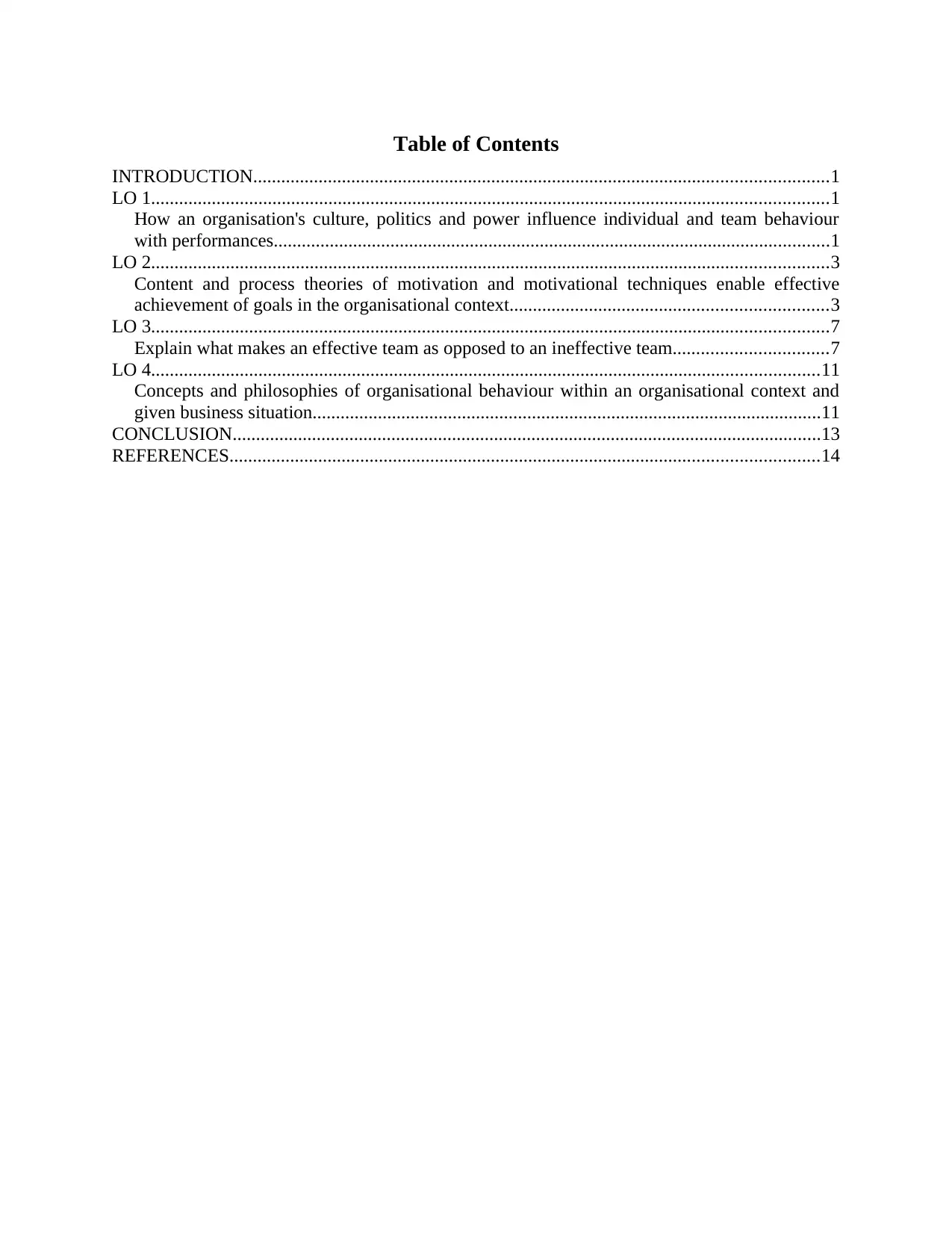
Table of Contents
INTRODUCTION...........................................................................................................................1
LO 1.................................................................................................................................................1
How an organisation's culture, politics and power influence individual and team behaviour
with performances.......................................................................................................................1
LO 2.................................................................................................................................................3
Content and process theories of motivation and motivational techniques enable effective
achievement of goals in the organisational context....................................................................3
LO 3.................................................................................................................................................7
Explain what makes an effective team as opposed to an ineffective team.................................7
LO 4...............................................................................................................................................11
Concepts and philosophies of organisational behaviour within an organisational context and
given business situation.............................................................................................................11
CONCLUSION..............................................................................................................................13
REFERENCES..............................................................................................................................14
INTRODUCTION...........................................................................................................................1
LO 1.................................................................................................................................................1
How an organisation's culture, politics and power influence individual and team behaviour
with performances.......................................................................................................................1
LO 2.................................................................................................................................................3
Content and process theories of motivation and motivational techniques enable effective
achievement of goals in the organisational context....................................................................3
LO 3.................................................................................................................................................7
Explain what makes an effective team as opposed to an ineffective team.................................7
LO 4...............................................................................................................................................11
Concepts and philosophies of organisational behaviour within an organisational context and
given business situation.............................................................................................................11
CONCLUSION..............................................................................................................................13
REFERENCES..............................................................................................................................14
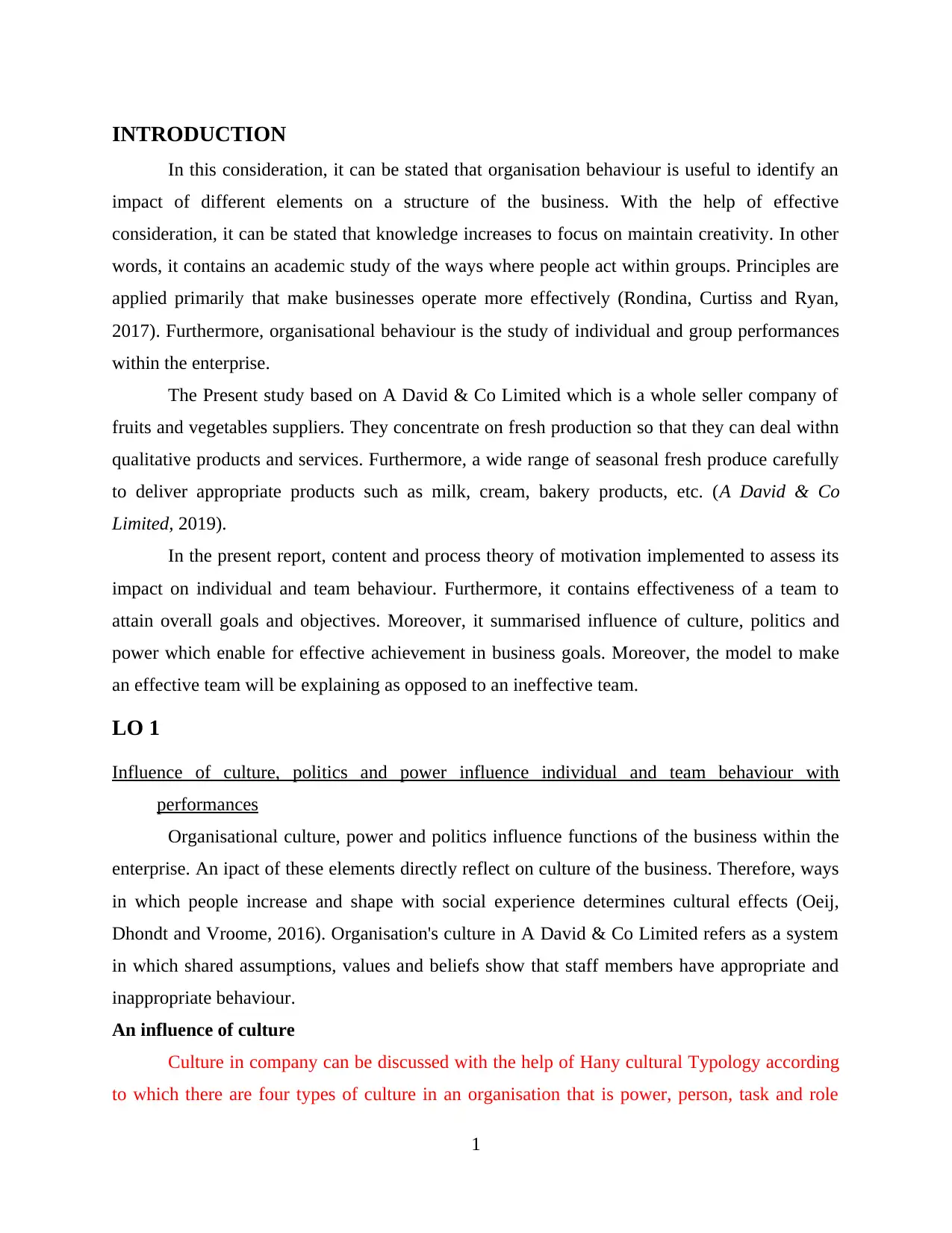
INTRODUCTION
In this consideration, it can be stated that organisation behaviour is useful to identify an
impact of different elements on a structure of the business. With the help of effective
consideration, it can be stated that knowledge increases to focus on maintain creativity. In other
words, it contains an academic study of the ways where people act within groups. Principles are
applied primarily that make businesses operate more effectively (Rondina, Curtiss and Ryan,
2017). Furthermore, organisational behaviour is the study of individual and group performances
within the enterprise.
The Present study based on A David & Co Limited which is a whole seller company of
fruits and vegetables suppliers. They concentrate on fresh production so that they can deal withn
qualitative products and services. Furthermore, a wide range of seasonal fresh produce carefully
to deliver appropriate products such as milk, cream, bakery products, etc. (A David & Co
Limited, 2019).
In the present report, content and process theory of motivation implemented to assess its
impact on individual and team behaviour. Furthermore, it contains effectiveness of a team to
attain overall goals and objectives. Moreover, it summarised influence of culture, politics and
power which enable for effective achievement in business goals. Moreover, the model to make
an effective team will be explaining as opposed to an ineffective team.
LO 1
Influence of culture, politics and power influence individual and team behaviour with
performances
Organisational culture, power and politics influence functions of the business within the
enterprise. An ipact of these elements directly reflect on culture of the business. Therefore, ways
in which people increase and shape with social experience determines cultural effects (Oeij,
Dhondt and Vroome, 2016). Organisation's culture in A David & Co Limited refers as a system
in which shared assumptions, values and beliefs show that staff members have appropriate and
inappropriate behaviour.
An influence of culture
Culture in company can be discussed with the help of Hany cultural Typology according
to which there are four types of culture in an organisation that is power, person, task and role
1
In this consideration, it can be stated that organisation behaviour is useful to identify an
impact of different elements on a structure of the business. With the help of effective
consideration, it can be stated that knowledge increases to focus on maintain creativity. In other
words, it contains an academic study of the ways where people act within groups. Principles are
applied primarily that make businesses operate more effectively (Rondina, Curtiss and Ryan,
2017). Furthermore, organisational behaviour is the study of individual and group performances
within the enterprise.
The Present study based on A David & Co Limited which is a whole seller company of
fruits and vegetables suppliers. They concentrate on fresh production so that they can deal withn
qualitative products and services. Furthermore, a wide range of seasonal fresh produce carefully
to deliver appropriate products such as milk, cream, bakery products, etc. (A David & Co
Limited, 2019).
In the present report, content and process theory of motivation implemented to assess its
impact on individual and team behaviour. Furthermore, it contains effectiveness of a team to
attain overall goals and objectives. Moreover, it summarised influence of culture, politics and
power which enable for effective achievement in business goals. Moreover, the model to make
an effective team will be explaining as opposed to an ineffective team.
LO 1
Influence of culture, politics and power influence individual and team behaviour with
performances
Organisational culture, power and politics influence functions of the business within the
enterprise. An ipact of these elements directly reflect on culture of the business. Therefore, ways
in which people increase and shape with social experience determines cultural effects (Oeij,
Dhondt and Vroome, 2016). Organisation's culture in A David & Co Limited refers as a system
in which shared assumptions, values and beliefs show that staff members have appropriate and
inappropriate behaviour.
An influence of culture
Culture in company can be discussed with the help of Hany cultural Typology according
to which there are four types of culture in an organisation that is power, person, task and role
1
⊘ This is a preview!⊘
Do you want full access?
Subscribe today to unlock all pages.

Trusted by 1+ million students worldwide
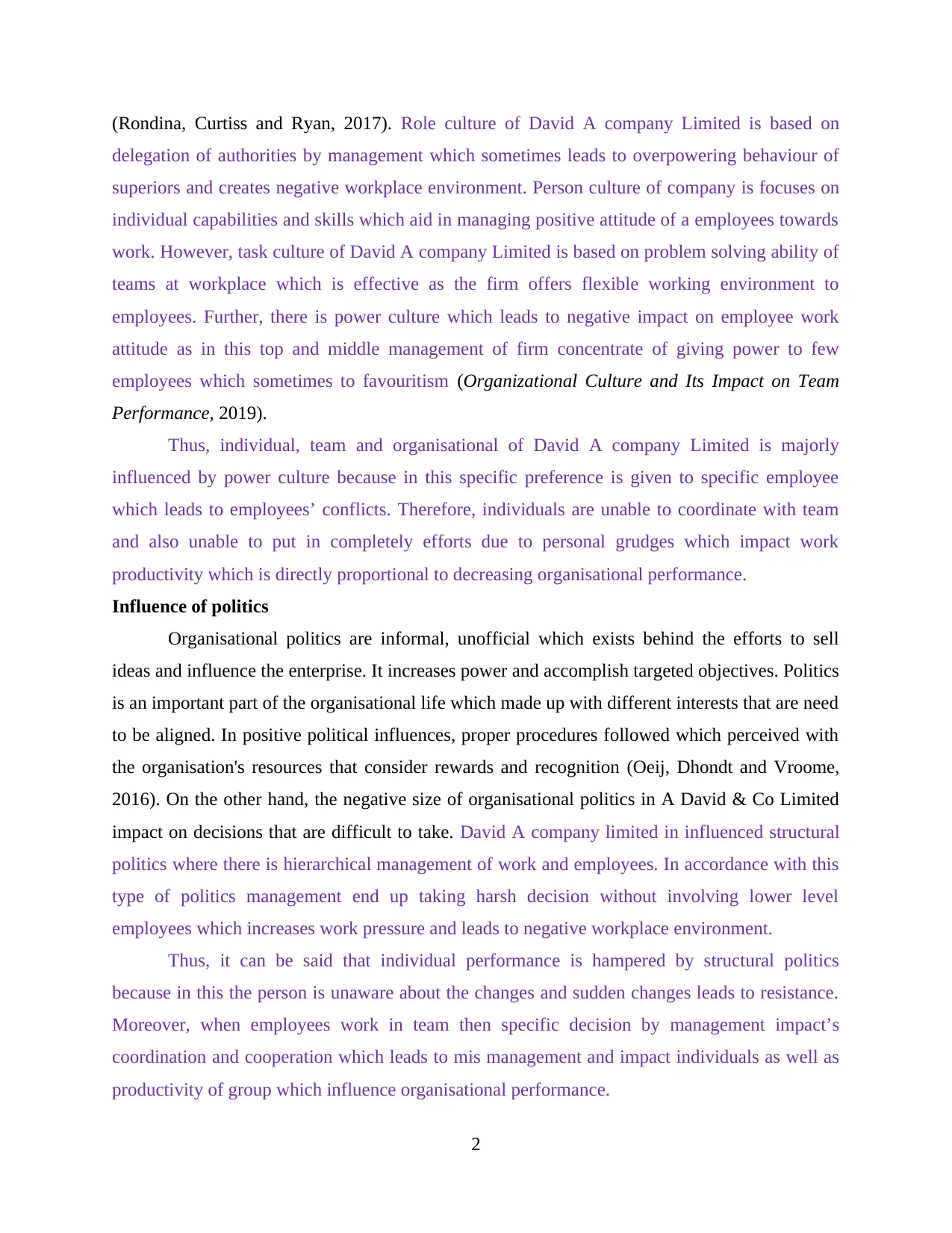
(Rondina, Curtiss and Ryan, 2017). Role culture of David A company Limited is based on
delegation of authorities by management which sometimes leads to overpowering behaviour of
superiors and creates negative workplace environment. Person culture of company is focuses on
individual capabilities and skills which aid in managing positive attitude of a employees towards
work. However, task culture of David A company Limited is based on problem solving ability of
teams at workplace which is effective as the firm offers flexible working environment to
employees. Further, there is power culture which leads to negative impact on employee work
attitude as in this top and middle management of firm concentrate of giving power to few
employees which sometimes to favouritism (Organizational Culture and Its Impact on Team
Performance, 2019).
Thus, individual, team and organisational of David A company Limited is majorly
influenced by power culture because in this specific preference is given to specific employee
which leads to employees’ conflicts. Therefore, individuals are unable to coordinate with team
and also unable to put in completely efforts due to personal grudges which impact work
productivity which is directly proportional to decreasing organisational performance.
Influence of politics
Organisational politics are informal, unofficial which exists behind the efforts to sell
ideas and influence the enterprise. It increases power and accomplish targeted objectives. Politics
is an important part of the organisational life which made up with different interests that are need
to be aligned. In positive political influences, proper procedures followed which perceived with
the organisation's resources that consider rewards and recognition (Oeij, Dhondt and Vroome,
2016). On the other hand, the negative size of organisational politics in A David & Co Limited
impact on decisions that are difficult to take. David A company limited in influenced structural
politics where there is hierarchical management of work and employees. In accordance with this
type of politics management end up taking harsh decision without involving lower level
employees which increases work pressure and leads to negative workplace environment.
Thus, it can be said that individual performance is hampered by structural politics
because in this the person is unaware about the changes and sudden changes leads to resistance.
Moreover, when employees work in team then specific decision by management impact’s
coordination and cooperation which leads to mis management and impact individuals as well as
productivity of group which influence organisational performance.
2
delegation of authorities by management which sometimes leads to overpowering behaviour of
superiors and creates negative workplace environment. Person culture of company is focuses on
individual capabilities and skills which aid in managing positive attitude of a employees towards
work. However, task culture of David A company Limited is based on problem solving ability of
teams at workplace which is effective as the firm offers flexible working environment to
employees. Further, there is power culture which leads to negative impact on employee work
attitude as in this top and middle management of firm concentrate of giving power to few
employees which sometimes to favouritism (Organizational Culture and Its Impact on Team
Performance, 2019).
Thus, individual, team and organisational of David A company Limited is majorly
influenced by power culture because in this specific preference is given to specific employee
which leads to employees’ conflicts. Therefore, individuals are unable to coordinate with team
and also unable to put in completely efforts due to personal grudges which impact work
productivity which is directly proportional to decreasing organisational performance.
Influence of politics
Organisational politics are informal, unofficial which exists behind the efforts to sell
ideas and influence the enterprise. It increases power and accomplish targeted objectives. Politics
is an important part of the organisational life which made up with different interests that are need
to be aligned. In positive political influences, proper procedures followed which perceived with
the organisation's resources that consider rewards and recognition (Oeij, Dhondt and Vroome,
2016). On the other hand, the negative size of organisational politics in A David & Co Limited
impact on decisions that are difficult to take. David A company limited in influenced structural
politics where there is hierarchical management of work and employees. In accordance with this
type of politics management end up taking harsh decision without involving lower level
employees which increases work pressure and leads to negative workplace environment.
Thus, it can be said that individual performance is hampered by structural politics
because in this the person is unaware about the changes and sudden changes leads to resistance.
Moreover, when employees work in team then specific decision by management impact’s
coordination and cooperation which leads to mis management and impact individuals as well as
productivity of group which influence organisational performance.
2
Paraphrase This Document
Need a fresh take? Get an instant paraphrase of this document with our AI Paraphraser
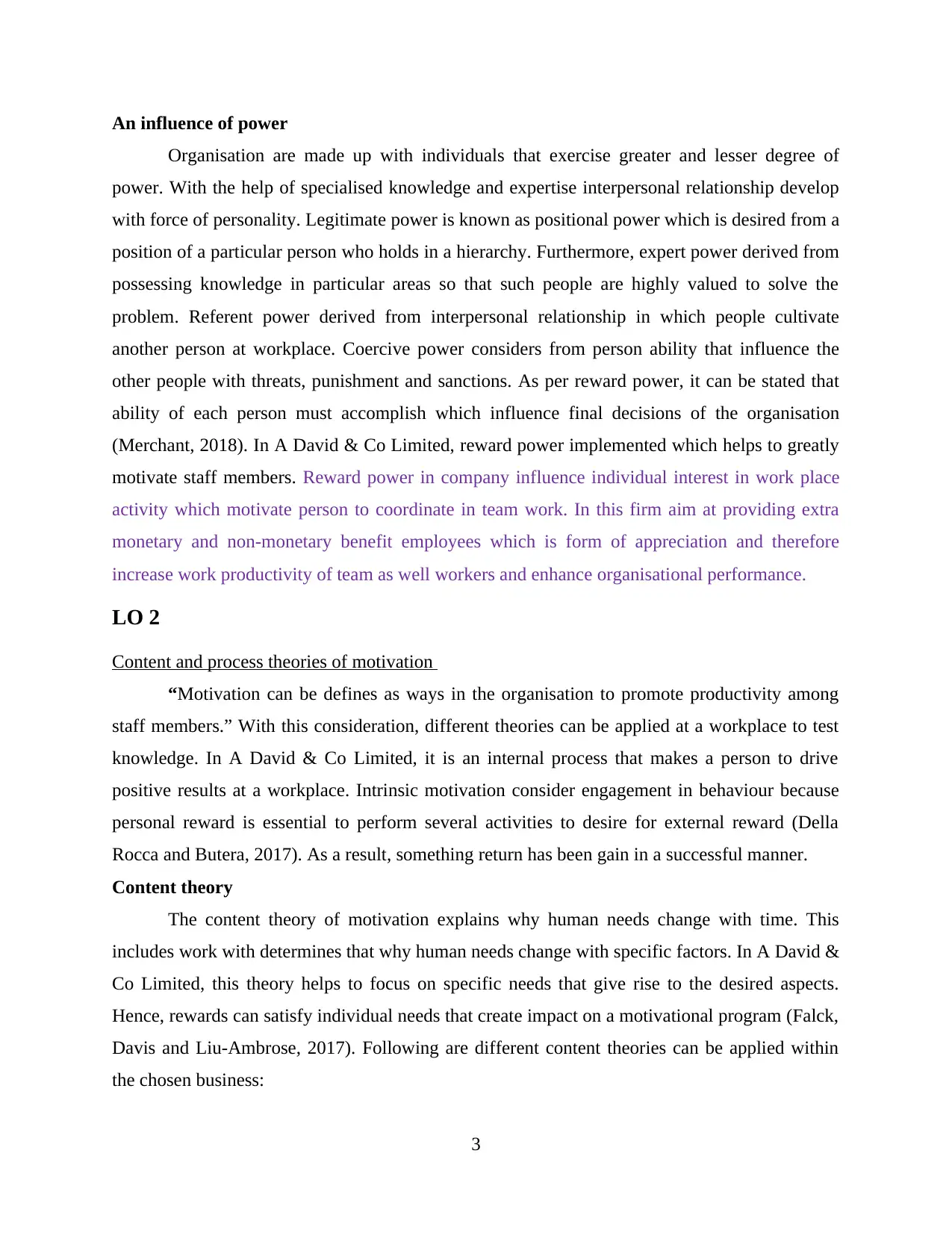
An influence of power
Organisation are made up with individuals that exercise greater and lesser degree of
power. With the help of specialised knowledge and expertise interpersonal relationship develop
with force of personality. Legitimate power is known as positional power which is desired from a
position of a particular person who holds in a hierarchy. Furthermore, expert power derived from
possessing knowledge in particular areas so that such people are highly valued to solve the
problem. Referent power derived from interpersonal relationship in which people cultivate
another person at workplace. Coercive power considers from person ability that influence the
other people with threats, punishment and sanctions. As per reward power, it can be stated that
ability of each person must accomplish which influence final decisions of the organisation
(Merchant, 2018). In A David & Co Limited, reward power implemented which helps to greatly
motivate staff members. Reward power in company influence individual interest in work place
activity which motivate person to coordinate in team work. In this firm aim at providing extra
monetary and non-monetary benefit employees which is form of appreciation and therefore
increase work productivity of team as well workers and enhance organisational performance.
LO 2
Content and process theories of motivation
“Motivation can be defines as ways in the organisation to promote productivity among
staff members.” With this consideration, different theories can be applied at a workplace to test
knowledge. In A David & Co Limited, it is an internal process that makes a person to drive
positive results at a workplace. Intrinsic motivation consider engagement in behaviour because
personal reward is essential to perform several activities to desire for external reward (Della
Rocca and Butera, 2017). As a result, something return has been gain in a successful manner.
Content theory
The content theory of motivation explains why human needs change with time. This
includes work with determines that why human needs change with specific factors. In A David &
Co Limited, this theory helps to focus on specific needs that give rise to the desired aspects.
Hence, rewards can satisfy individual needs that create impact on a motivational program (Falck,
Davis and Liu-Ambrose, 2017). Following are different content theories can be applied within
the chosen business:
3
Organisation are made up with individuals that exercise greater and lesser degree of
power. With the help of specialised knowledge and expertise interpersonal relationship develop
with force of personality. Legitimate power is known as positional power which is desired from a
position of a particular person who holds in a hierarchy. Furthermore, expert power derived from
possessing knowledge in particular areas so that such people are highly valued to solve the
problem. Referent power derived from interpersonal relationship in which people cultivate
another person at workplace. Coercive power considers from person ability that influence the
other people with threats, punishment and sanctions. As per reward power, it can be stated that
ability of each person must accomplish which influence final decisions of the organisation
(Merchant, 2018). In A David & Co Limited, reward power implemented which helps to greatly
motivate staff members. Reward power in company influence individual interest in work place
activity which motivate person to coordinate in team work. In this firm aim at providing extra
monetary and non-monetary benefit employees which is form of appreciation and therefore
increase work productivity of team as well workers and enhance organisational performance.
LO 2
Content and process theories of motivation
“Motivation can be defines as ways in the organisation to promote productivity among
staff members.” With this consideration, different theories can be applied at a workplace to test
knowledge. In A David & Co Limited, it is an internal process that makes a person to drive
positive results at a workplace. Intrinsic motivation consider engagement in behaviour because
personal reward is essential to perform several activities to desire for external reward (Della
Rocca and Butera, 2017). As a result, something return has been gain in a successful manner.
Content theory
The content theory of motivation explains why human needs change with time. This
includes work with determines that why human needs change with specific factors. In A David &
Co Limited, this theory helps to focus on specific needs that give rise to the desired aspects.
Hence, rewards can satisfy individual needs that create impact on a motivational program (Falck,
Davis and Liu-Ambrose, 2017). Following are different content theories can be applied within
the chosen business:
3

Maslow's theory
This theory content five basic categories of needs. These kinds of needs ordered in a
hierarchy which includes basic psychological, safety, belonging and love, esteem and self-
actualisation. Hence, in A David & Co Limited is important to fulfil each person requirement in
this manner.
As per physiological needs, food, water, shelter and sleep are the most basic level of
needs with human can survive. If these needs are not satisfied, a human body cannot function
optimally (Oeij, Dhondt and Vroome, 2016). It plays a very important role to fulfil needs of
people and increase their satisfaction level as well. In accordance with this motivation A David
& Co Limited can engage in providing transportation and accommodation to workers. Firm can
provide lunch and dinner facilities to employees. This can assist the firm in gaining employees
loyalty because by fulfilling this need company will be able to demonstrate importance of
employees and their work and will reduce absenteeism and dissatisfaction.
4
Illustration 1: Maslow's need of a hierarchy of the model
(Source: Maslow's Hierarchy of Needs, 2019)
This theory content five basic categories of needs. These kinds of needs ordered in a
hierarchy which includes basic psychological, safety, belonging and love, esteem and self-
actualisation. Hence, in A David & Co Limited is important to fulfil each person requirement in
this manner.
As per physiological needs, food, water, shelter and sleep are the most basic level of
needs with human can survive. If these needs are not satisfied, a human body cannot function
optimally (Oeij, Dhondt and Vroome, 2016). It plays a very important role to fulfil needs of
people and increase their satisfaction level as well. In accordance with this motivation A David
& Co Limited can engage in providing transportation and accommodation to workers. Firm can
provide lunch and dinner facilities to employees. This can assist the firm in gaining employees
loyalty because by fulfilling this need company will be able to demonstrate importance of
employees and their work and will reduce absenteeism and dissatisfaction.
4
Illustration 1: Maslow's need of a hierarchy of the model
(Source: Maslow's Hierarchy of Needs, 2019)
⊘ This is a preview!⊘
Do you want full access?
Subscribe today to unlock all pages.

Trusted by 1+ million students worldwide
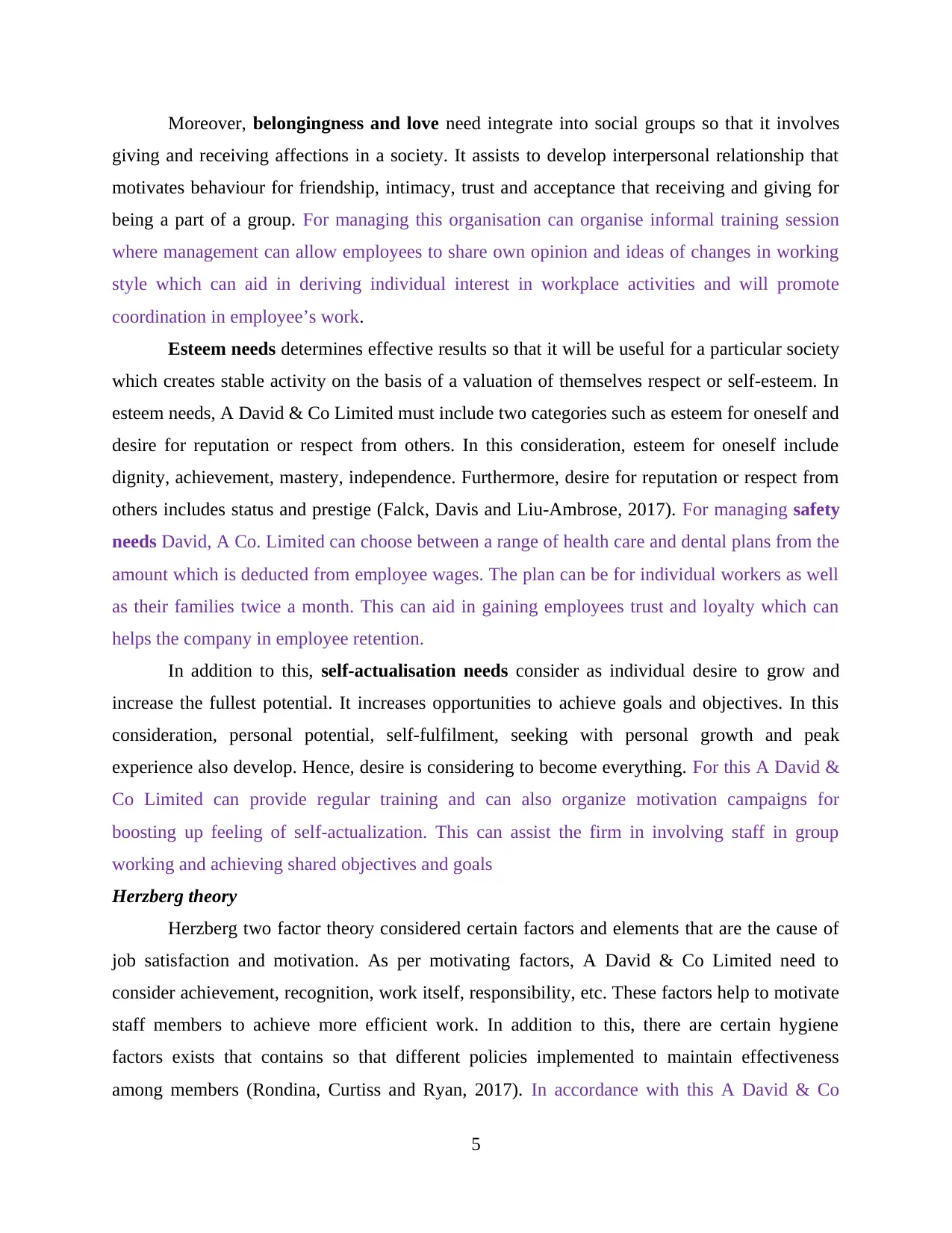
Moreover, belongingness and love need integrate into social groups so that it involves
giving and receiving affections in a society. It assists to develop interpersonal relationship that
motivates behaviour for friendship, intimacy, trust and acceptance that receiving and giving for
being a part of a group. For managing this organisation can organise informal training session
where management can allow employees to share own opinion and ideas of changes in working
style which can aid in deriving individual interest in workplace activities and will promote
coordination in employee’s work.
Esteem needs determines effective results so that it will be useful for a particular society
which creates stable activity on the basis of a valuation of themselves respect or self-esteem. In
esteem needs, A David & Co Limited must include two categories such as esteem for oneself and
desire for reputation or respect from others. In this consideration, esteem for oneself include
dignity, achievement, mastery, independence. Furthermore, desire for reputation or respect from
others includes status and prestige (Falck, Davis and Liu-Ambrose, 2017). For managing safety
needs David, A Co. Limited can choose between a range of health care and dental plans from the
amount which is deducted from employee wages. The plan can be for individual workers as well
as their families twice a month. This can aid in gaining employees trust and loyalty which can
helps the company in employee retention.
In addition to this, self-actualisation needs consider as individual desire to grow and
increase the fullest potential. It increases opportunities to achieve goals and objectives. In this
consideration, personal potential, self-fulfilment, seeking with personal growth and peak
experience also develop. Hence, desire is considering to become everything. For this A David &
Co Limited can provide regular training and can also organize motivation campaigns for
boosting up feeling of self-actualization. This can assist the firm in involving staff in group
working and achieving shared objectives and goals
Herzberg theory
Herzberg two factor theory considered certain factors and elements that are the cause of
job satisfaction and motivation. As per motivating factors, A David & Co Limited need to
consider achievement, recognition, work itself, responsibility, etc. These factors help to motivate
staff members to achieve more efficient work. In addition to this, there are certain hygiene
factors exists that contains so that different policies implemented to maintain effectiveness
among members (Rondina, Curtiss and Ryan, 2017). In accordance with this A David & Co
5
giving and receiving affections in a society. It assists to develop interpersonal relationship that
motivates behaviour for friendship, intimacy, trust and acceptance that receiving and giving for
being a part of a group. For managing this organisation can organise informal training session
where management can allow employees to share own opinion and ideas of changes in working
style which can aid in deriving individual interest in workplace activities and will promote
coordination in employee’s work.
Esteem needs determines effective results so that it will be useful for a particular society
which creates stable activity on the basis of a valuation of themselves respect or self-esteem. In
esteem needs, A David & Co Limited must include two categories such as esteem for oneself and
desire for reputation or respect from others. In this consideration, esteem for oneself include
dignity, achievement, mastery, independence. Furthermore, desire for reputation or respect from
others includes status and prestige (Falck, Davis and Liu-Ambrose, 2017). For managing safety
needs David, A Co. Limited can choose between a range of health care and dental plans from the
amount which is deducted from employee wages. The plan can be for individual workers as well
as their families twice a month. This can aid in gaining employees trust and loyalty which can
helps the company in employee retention.
In addition to this, self-actualisation needs consider as individual desire to grow and
increase the fullest potential. It increases opportunities to achieve goals and objectives. In this
consideration, personal potential, self-fulfilment, seeking with personal growth and peak
experience also develop. Hence, desire is considering to become everything. For this A David &
Co Limited can provide regular training and can also organize motivation campaigns for
boosting up feeling of self-actualization. This can assist the firm in involving staff in group
working and achieving shared objectives and goals
Herzberg theory
Herzberg two factor theory considered certain factors and elements that are the cause of
job satisfaction and motivation. As per motivating factors, A David & Co Limited need to
consider achievement, recognition, work itself, responsibility, etc. These factors help to motivate
staff members to achieve more efficient work. In addition to this, there are certain hygiene
factors exists that contains so that different policies implemented to maintain effectiveness
among members (Rondina, Curtiss and Ryan, 2017). In accordance with this A David & Co
5
Paraphrase This Document
Need a fresh take? Get an instant paraphrase of this document with our AI Paraphraser
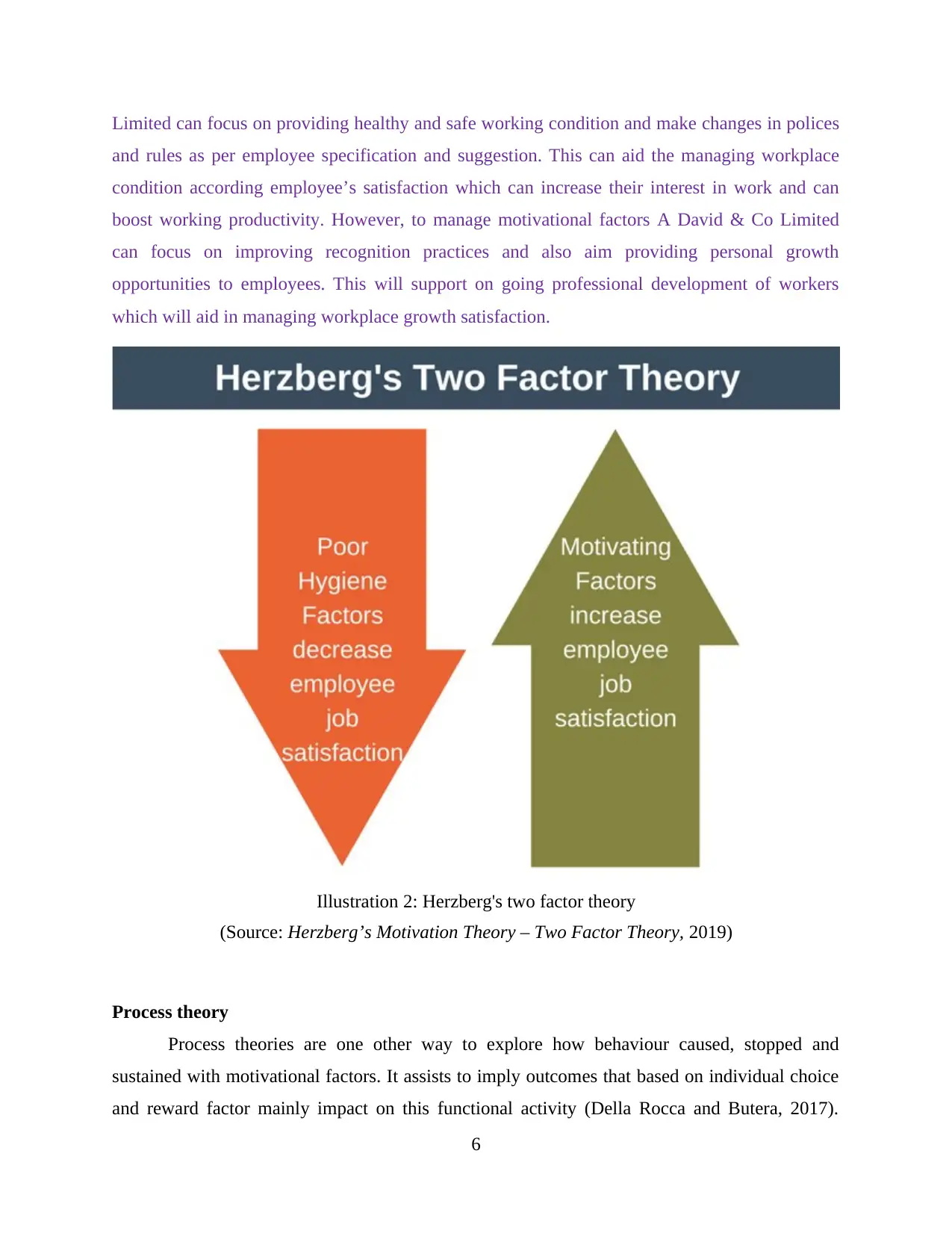
Limited can focus on providing healthy and safe working condition and make changes in polices
and rules as per employee specification and suggestion. This can aid the managing workplace
condition according employee’s satisfaction which can increase their interest in work and can
boost working productivity. However, to manage motivational factors A David & Co Limited
can focus on improving recognition practices and also aim providing personal growth
opportunities to employees. This will support on going professional development of workers
which will aid in managing workplace growth satisfaction.
Process theory
Process theories are one other way to explore how behaviour caused, stopped and
sustained with motivational factors. It assists to imply outcomes that based on individual choice
and reward factor mainly impact on this functional activity (Della Rocca and Butera, 2017).
6
Illustration 2: Herzberg's two factor theory
(Source: Herzberg’s Motivation Theory – Two Factor Theory, 2019)
and rules as per employee specification and suggestion. This can aid the managing workplace
condition according employee’s satisfaction which can increase their interest in work and can
boost working productivity. However, to manage motivational factors A David & Co Limited
can focus on improving recognition practices and also aim providing personal growth
opportunities to employees. This will support on going professional development of workers
which will aid in managing workplace growth satisfaction.
Process theory
Process theories are one other way to explore how behaviour caused, stopped and
sustained with motivational factors. It assists to imply outcomes that based on individual choice
and reward factor mainly impact on this functional activity (Della Rocca and Butera, 2017).
6
Illustration 2: Herzberg's two factor theory
(Source: Herzberg’s Motivation Theory – Two Factor Theory, 2019)
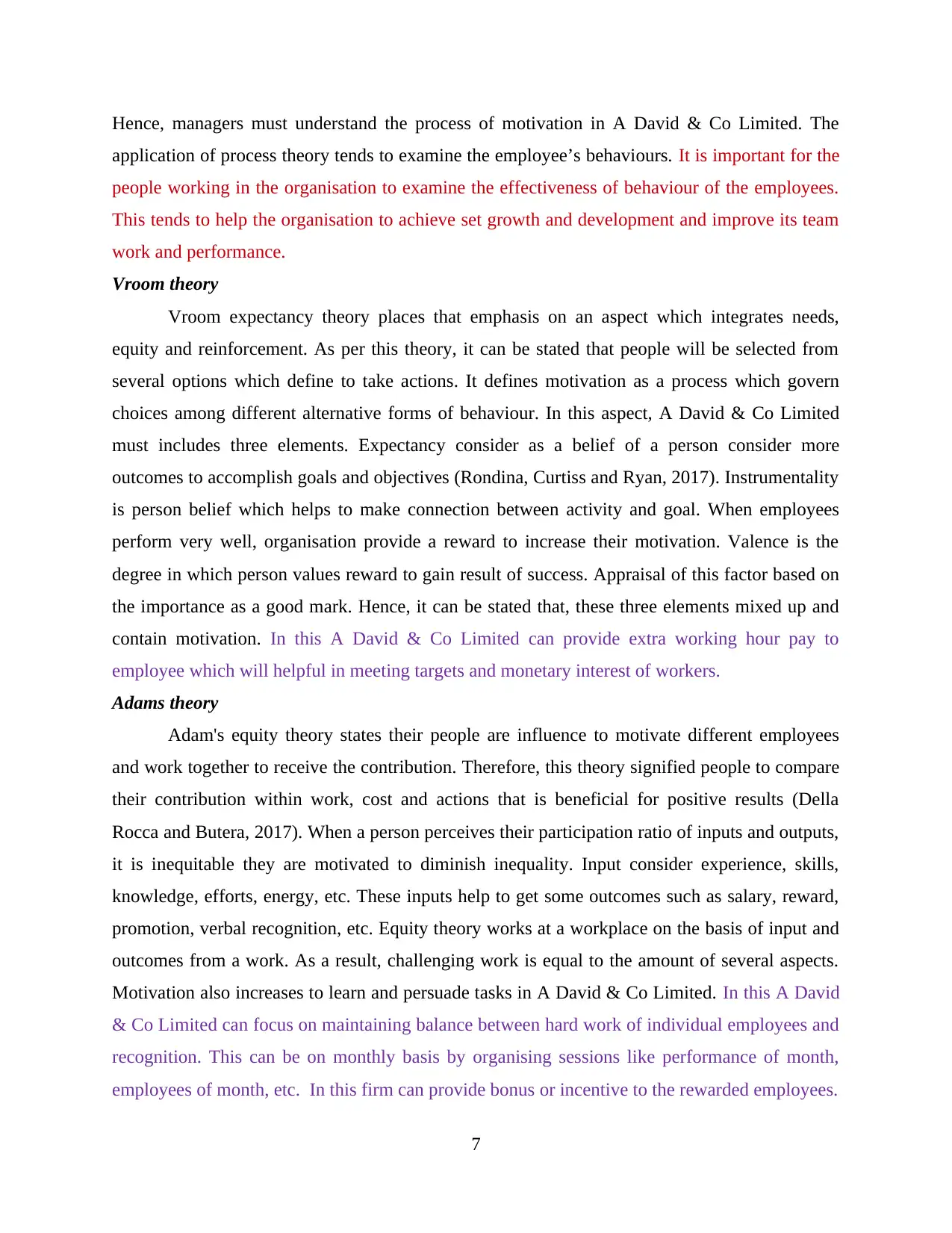
Hence, managers must understand the process of motivation in A David & Co Limited. The
application of process theory tends to examine the employee’s behaviours. It is important for the
people working in the organisation to examine the effectiveness of behaviour of the employees.
This tends to help the organisation to achieve set growth and development and improve its team
work and performance.
Vroom theory
Vroom expectancy theory places that emphasis on an aspect which integrates needs,
equity and reinforcement. As per this theory, it can be stated that people will be selected from
several options which define to take actions. It defines motivation as a process which govern
choices among different alternative forms of behaviour. In this aspect, A David & Co Limited
must includes three elements. Expectancy consider as a belief of a person consider more
outcomes to accomplish goals and objectives (Rondina, Curtiss and Ryan, 2017). Instrumentality
is person belief which helps to make connection between activity and goal. When employees
perform very well, organisation provide a reward to increase their motivation. Valence is the
degree in which person values reward to gain result of success. Appraisal of this factor based on
the importance as a good mark. Hence, it can be stated that, these three elements mixed up and
contain motivation. In this A David & Co Limited can provide extra working hour pay to
employee which will helpful in meeting targets and monetary interest of workers.
Adams theory
Adam's equity theory states their people are influence to motivate different employees
and work together to receive the contribution. Therefore, this theory signified people to compare
their contribution within work, cost and actions that is beneficial for positive results (Della
Rocca and Butera, 2017). When a person perceives their participation ratio of inputs and outputs,
it is inequitable they are motivated to diminish inequality. Input consider experience, skills,
knowledge, efforts, energy, etc. These inputs help to get some outcomes such as salary, reward,
promotion, verbal recognition, etc. Equity theory works at a workplace on the basis of input and
outcomes from a work. As a result, challenging work is equal to the amount of several aspects.
Motivation also increases to learn and persuade tasks in A David & Co Limited. In this A David
& Co Limited can focus on maintaining balance between hard work of individual employees and
recognition. This can be on monthly basis by organising sessions like performance of month,
employees of month, etc. In this firm can provide bonus or incentive to the rewarded employees.
7
application of process theory tends to examine the employee’s behaviours. It is important for the
people working in the organisation to examine the effectiveness of behaviour of the employees.
This tends to help the organisation to achieve set growth and development and improve its team
work and performance.
Vroom theory
Vroom expectancy theory places that emphasis on an aspect which integrates needs,
equity and reinforcement. As per this theory, it can be stated that people will be selected from
several options which define to take actions. It defines motivation as a process which govern
choices among different alternative forms of behaviour. In this aspect, A David & Co Limited
must includes three elements. Expectancy consider as a belief of a person consider more
outcomes to accomplish goals and objectives (Rondina, Curtiss and Ryan, 2017). Instrumentality
is person belief which helps to make connection between activity and goal. When employees
perform very well, organisation provide a reward to increase their motivation. Valence is the
degree in which person values reward to gain result of success. Appraisal of this factor based on
the importance as a good mark. Hence, it can be stated that, these three elements mixed up and
contain motivation. In this A David & Co Limited can provide extra working hour pay to
employee which will helpful in meeting targets and monetary interest of workers.
Adams theory
Adam's equity theory states their people are influence to motivate different employees
and work together to receive the contribution. Therefore, this theory signified people to compare
their contribution within work, cost and actions that is beneficial for positive results (Della
Rocca and Butera, 2017). When a person perceives their participation ratio of inputs and outputs,
it is inequitable they are motivated to diminish inequality. Input consider experience, skills,
knowledge, efforts, energy, etc. These inputs help to get some outcomes such as salary, reward,
promotion, verbal recognition, etc. Equity theory works at a workplace on the basis of input and
outcomes from a work. As a result, challenging work is equal to the amount of several aspects.
Motivation also increases to learn and persuade tasks in A David & Co Limited. In this A David
& Co Limited can focus on maintaining balance between hard work of individual employees and
recognition. This can be on monthly basis by organising sessions like performance of month,
employees of month, etc. In this firm can provide bonus or incentive to the rewarded employees.
7
⊘ This is a preview!⊘
Do you want full access?
Subscribe today to unlock all pages.

Trusted by 1+ million students worldwide
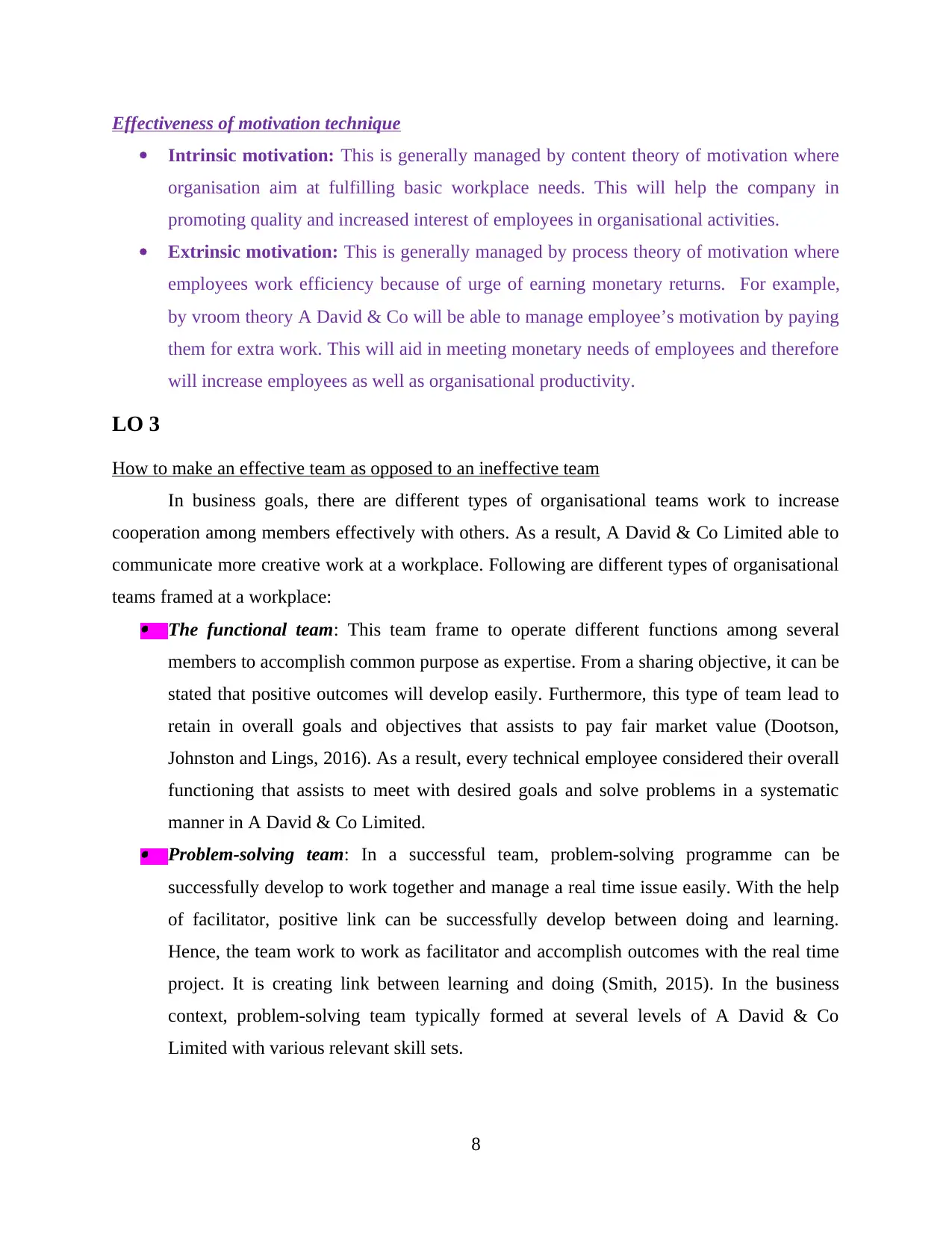
Effectiveness of motivation technique
Intrinsic motivation: This is generally managed by content theory of motivation where
organisation aim at fulfilling basic workplace needs. This will help the company in
promoting quality and increased interest of employees in organisational activities.
Extrinsic motivation: This is generally managed by process theory of motivation where
employees work efficiency because of urge of earning monetary returns. For example,
by vroom theory A David & Co will be able to manage employee’s motivation by paying
them for extra work. This will aid in meeting monetary needs of employees and therefore
will increase employees as well as organisational productivity.
LO 3
How to make an effective team as opposed to an ineffective team
In business goals, there are different types of organisational teams work to increase
cooperation among members effectively with others. As a result, A David & Co Limited able to
communicate more creative work at a workplace. Following are different types of organisational
teams framed at a workplace: The functional team: This team frame to operate different functions among several
members to accomplish common purpose as expertise. From a sharing objective, it can be
stated that positive outcomes will develop easily. Furthermore, this type of team lead to
retain in overall goals and objectives that assists to pay fair market value (Dootson,
Johnston and Lings, 2016). As a result, every technical employee considered their overall
functioning that assists to meet with desired goals and solve problems in a systematic
manner in A David & Co Limited. Problem-solving team: In a successful team, problem-solving programme can be
successfully develop to work together and manage a real time issue easily. With the help
of facilitator, positive link can be successfully develop between doing and learning.
Hence, the team work to work as facilitator and accomplish outcomes with the real time
project. It is creating link between learning and doing (Smith, 2015). In the business
context, problem-solving team typically formed at several levels of A David & Co
Limited with various relevant skill sets.
8
Intrinsic motivation: This is generally managed by content theory of motivation where
organisation aim at fulfilling basic workplace needs. This will help the company in
promoting quality and increased interest of employees in organisational activities.
Extrinsic motivation: This is generally managed by process theory of motivation where
employees work efficiency because of urge of earning monetary returns. For example,
by vroom theory A David & Co will be able to manage employee’s motivation by paying
them for extra work. This will aid in meeting monetary needs of employees and therefore
will increase employees as well as organisational productivity.
LO 3
How to make an effective team as opposed to an ineffective team
In business goals, there are different types of organisational teams work to increase
cooperation among members effectively with others. As a result, A David & Co Limited able to
communicate more creative work at a workplace. Following are different types of organisational
teams framed at a workplace: The functional team: This team frame to operate different functions among several
members to accomplish common purpose as expertise. From a sharing objective, it can be
stated that positive outcomes will develop easily. Furthermore, this type of team lead to
retain in overall goals and objectives that assists to pay fair market value (Dootson,
Johnston and Lings, 2016). As a result, every technical employee considered their overall
functioning that assists to meet with desired goals and solve problems in a systematic
manner in A David & Co Limited. Problem-solving team: In a successful team, problem-solving programme can be
successfully develop to work together and manage a real time issue easily. With the help
of facilitator, positive link can be successfully develop between doing and learning.
Hence, the team work to work as facilitator and accomplish outcomes with the real time
project. It is creating link between learning and doing (Smith, 2015). In the business
context, problem-solving team typically formed at several levels of A David & Co
Limited with various relevant skill sets.
8
Paraphrase This Document
Need a fresh take? Get an instant paraphrase of this document with our AI Paraphraser
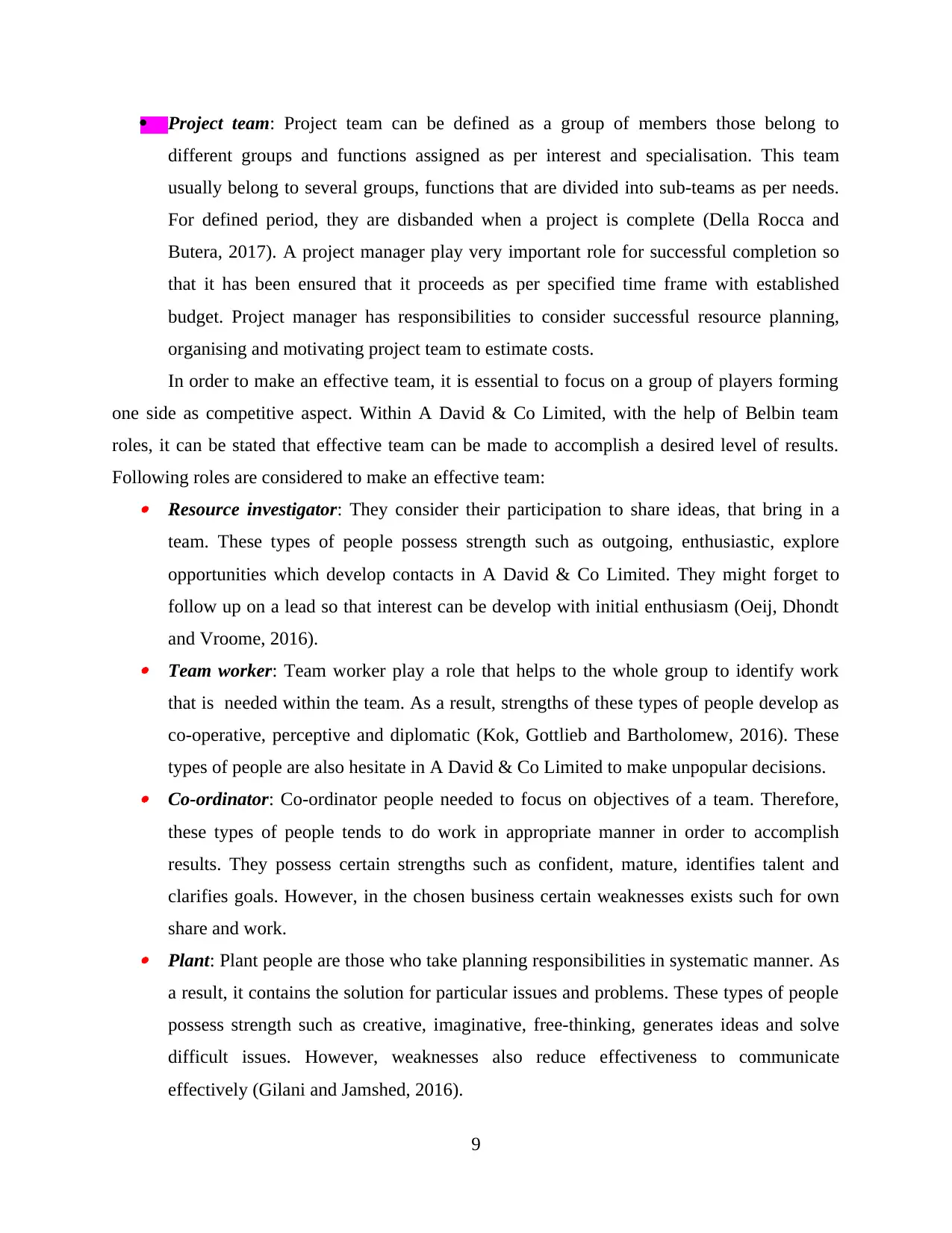
Project team: Project team can be defined as a group of members those belong to
different groups and functions assigned as per interest and specialisation. This team
usually belong to several groups, functions that are divided into sub-teams as per needs.
For defined period, they are disbanded when a project is complete (Della Rocca and
Butera, 2017). A project manager play very important role for successful completion so
that it has been ensured that it proceeds as per specified time frame with established
budget. Project manager has responsibilities to consider successful resource planning,
organising and motivating project team to estimate costs.
In order to make an effective team, it is essential to focus on a group of players forming
one side as competitive aspect. Within A David & Co Limited, with the help of Belbin team
roles, it can be stated that effective team can be made to accomplish a desired level of results.
Following roles are considered to make an effective team: Resource investigator: They consider their participation to share ideas, that bring in a
team. These types of people possess strength such as outgoing, enthusiastic, explore
opportunities which develop contacts in A David & Co Limited. They might forget to
follow up on a lead so that interest can be develop with initial enthusiasm (Oeij, Dhondt
and Vroome, 2016). Team worker: Team worker play a role that helps to the whole group to identify work
that is needed within the team. As a result, strengths of these types of people develop as
co-operative, perceptive and diplomatic (Kok, Gottlieb and Bartholomew, 2016). These
types of people are also hesitate in A David & Co Limited to make unpopular decisions. Co-ordinator: Co-ordinator people needed to focus on objectives of a team. Therefore,
these types of people tends to do work in appropriate manner in order to accomplish
results. They possess certain strengths such as confident, mature, identifies talent and
clarifies goals. However, in the chosen business certain weaknesses exists such for own
share and work. Plant: Plant people are those who take planning responsibilities in systematic manner. As
a result, it contains the solution for particular issues and problems. These types of people
possess strength such as creative, imaginative, free-thinking, generates ideas and solve
difficult issues. However, weaknesses also reduce effectiveness to communicate
effectively (Gilani and Jamshed, 2016).
9
different groups and functions assigned as per interest and specialisation. This team
usually belong to several groups, functions that are divided into sub-teams as per needs.
For defined period, they are disbanded when a project is complete (Della Rocca and
Butera, 2017). A project manager play very important role for successful completion so
that it has been ensured that it proceeds as per specified time frame with established
budget. Project manager has responsibilities to consider successful resource planning,
organising and motivating project team to estimate costs.
In order to make an effective team, it is essential to focus on a group of players forming
one side as competitive aspect. Within A David & Co Limited, with the help of Belbin team
roles, it can be stated that effective team can be made to accomplish a desired level of results.
Following roles are considered to make an effective team: Resource investigator: They consider their participation to share ideas, that bring in a
team. These types of people possess strength such as outgoing, enthusiastic, explore
opportunities which develop contacts in A David & Co Limited. They might forget to
follow up on a lead so that interest can be develop with initial enthusiasm (Oeij, Dhondt
and Vroome, 2016). Team worker: Team worker play a role that helps to the whole group to identify work
that is needed within the team. As a result, strengths of these types of people develop as
co-operative, perceptive and diplomatic (Kok, Gottlieb and Bartholomew, 2016). These
types of people are also hesitate in A David & Co Limited to make unpopular decisions. Co-ordinator: Co-ordinator people needed to focus on objectives of a team. Therefore,
these types of people tends to do work in appropriate manner in order to accomplish
results. They possess certain strengths such as confident, mature, identifies talent and
clarifies goals. However, in the chosen business certain weaknesses exists such for own
share and work. Plant: Plant people are those who take planning responsibilities in systematic manner. As
a result, it contains the solution for particular issues and problems. These types of people
possess strength such as creative, imaginative, free-thinking, generates ideas and solve
difficult issues. However, weaknesses also reduce effectiveness to communicate
effectively (Gilani and Jamshed, 2016).
9
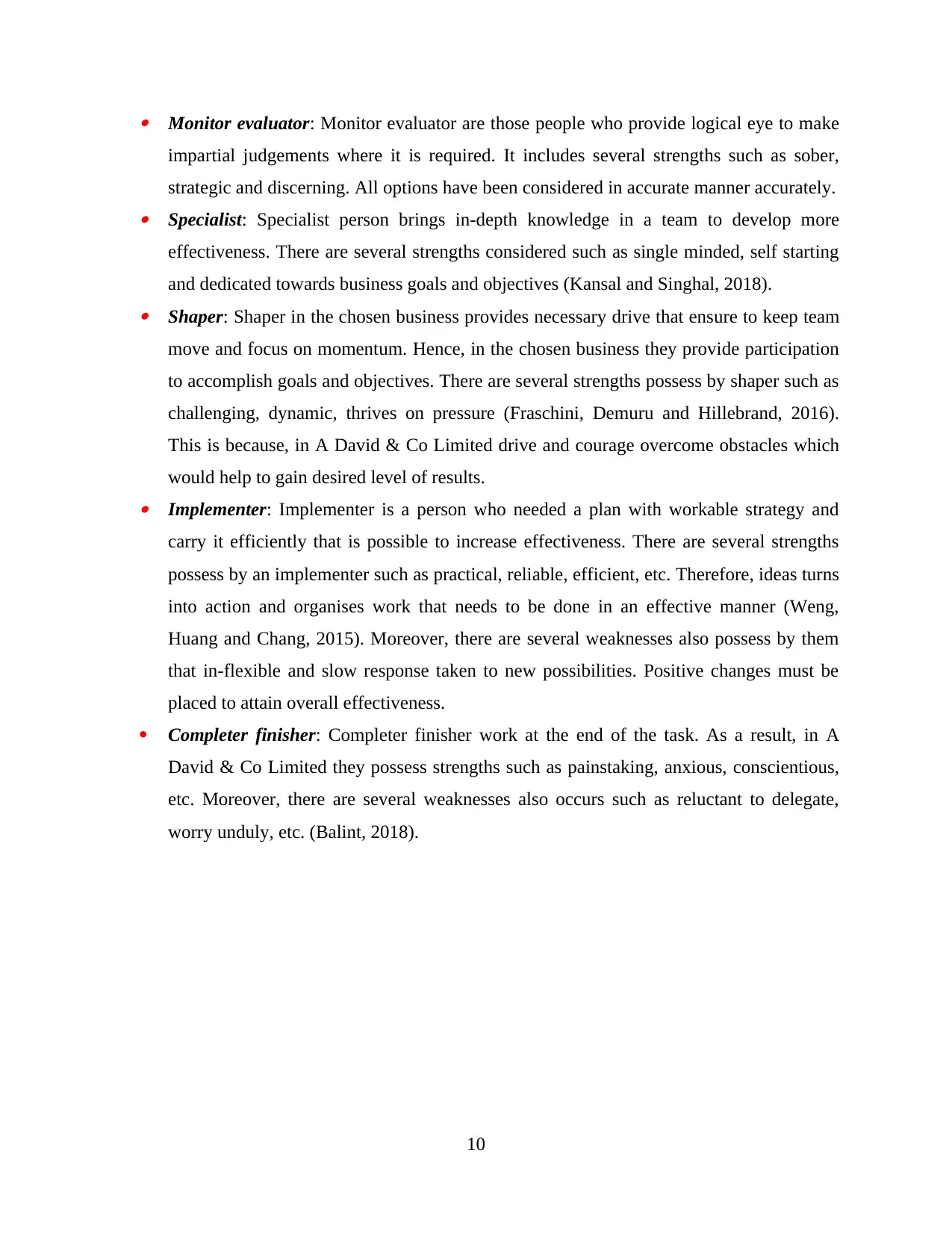
Monitor evaluator: Monitor evaluator are those people who provide logical eye to make
impartial judgements where it is required. It includes several strengths such as sober,
strategic and discerning. All options have been considered in accurate manner accurately. Specialist: Specialist person brings in-depth knowledge in a team to develop more
effectiveness. There are several strengths considered such as single minded, self starting
and dedicated towards business goals and objectives (Kansal and Singhal, 2018). Shaper: Shaper in the chosen business provides necessary drive that ensure to keep team
move and focus on momentum. Hence, in the chosen business they provide participation
to accomplish goals and objectives. There are several strengths possess by shaper such as
challenging, dynamic, thrives on pressure (Fraschini, Demuru and Hillebrand, 2016).
This is because, in A David & Co Limited drive and courage overcome obstacles which
would help to gain desired level of results. Implementer: Implementer is a person who needed a plan with workable strategy and
carry it efficiently that is possible to increase effectiveness. There are several strengths
possess by an implementer such as practical, reliable, efficient, etc. Therefore, ideas turns
into action and organises work that needs to be done in an effective manner (Weng,
Huang and Chang, 2015). Moreover, there are several weaknesses also possess by them
that in-flexible and slow response taken to new possibilities. Positive changes must be
placed to attain overall effectiveness.
Completer finisher: Completer finisher work at the end of the task. As a result, in A
David & Co Limited they possess strengths such as painstaking, anxious, conscientious,
etc. Moreover, there are several weaknesses also occurs such as reluctant to delegate,
worry unduly, etc. (Balint, 2018).
10
impartial judgements where it is required. It includes several strengths such as sober,
strategic and discerning. All options have been considered in accurate manner accurately. Specialist: Specialist person brings in-depth knowledge in a team to develop more
effectiveness. There are several strengths considered such as single minded, self starting
and dedicated towards business goals and objectives (Kansal and Singhal, 2018). Shaper: Shaper in the chosen business provides necessary drive that ensure to keep team
move and focus on momentum. Hence, in the chosen business they provide participation
to accomplish goals and objectives. There are several strengths possess by shaper such as
challenging, dynamic, thrives on pressure (Fraschini, Demuru and Hillebrand, 2016).
This is because, in A David & Co Limited drive and courage overcome obstacles which
would help to gain desired level of results. Implementer: Implementer is a person who needed a plan with workable strategy and
carry it efficiently that is possible to increase effectiveness. There are several strengths
possess by an implementer such as practical, reliable, efficient, etc. Therefore, ideas turns
into action and organises work that needs to be done in an effective manner (Weng,
Huang and Chang, 2015). Moreover, there are several weaknesses also possess by them
that in-flexible and slow response taken to new possibilities. Positive changes must be
placed to attain overall effectiveness.
Completer finisher: Completer finisher work at the end of the task. As a result, in A
David & Co Limited they possess strengths such as painstaking, anxious, conscientious,
etc. Moreover, there are several weaknesses also occurs such as reluctant to delegate,
worry unduly, etc. (Balint, 2018).
10
⊘ This is a preview!⊘
Do you want full access?
Subscribe today to unlock all pages.

Trusted by 1+ million students worldwide
1 out of 18
Related Documents
Your All-in-One AI-Powered Toolkit for Academic Success.
+13062052269
info@desklib.com
Available 24*7 on WhatsApp / Email
![[object Object]](/_next/static/media/star-bottom.7253800d.svg)
Unlock your academic potential
Copyright © 2020–2025 A2Z Services. All Rights Reserved. Developed and managed by ZUCOL.





